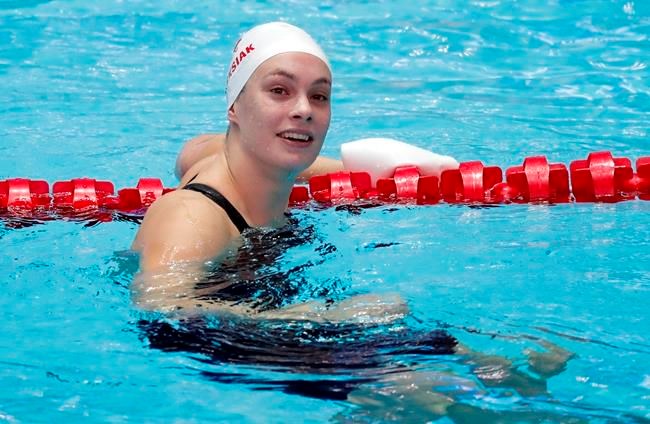Canada is sending one of its largest teams ever to a Summer Olympics despite the pandemic challenges imposed on its athletes over the last year and a half.
The 371 athletes headed to Tokyo is Canada's largest team since the 1984 Summer Games in Los Angeles.
Sixty per cent of the team is female with 225 women and 146 men donning the Maple Leaf for the Tokyo Olympics opening July 23. They'll be accompanied by 131 coaches.
The headliners include sprint star Andre De Grasse, multi-medallist swimmer Penny Oleksiak, champion wrestler Erica Wiebe, two-time trampoline gold medallist Rosie MacLennan, golfer Brooke Henderson and soccer player Christine Sinclair.
Tennis star Bianca Andreescu withdrew from the Canadian team this week citing pandemic-related challenges.
Denis Shapovalov, who reached the Wimbledon's men's semifinal, opted out last month.
Eight teams competing in women's soccer, basketball, softball, rugby sevens and water polo and men's volleyball, rugby sevens and field hockey ties the most for a non-boycotted, non-hosted Summer Games, and swells Canada's numbers particularly on the women's side.
All eight teams qualified before the COVID-19 pandemic that delayed Tokyo's 2020 Summer Games a year.
Chances to qualify for Tokyo in 2021 shrunk because the pandemic wiped out many competitions for Canada's aspiring Olympians.
"It has been uniquely hard for athletes in the Americas to get to qualifying events, versus the other qualifying quadrants around the world," said Canadian chef de mission Marnie McBean.
"I always recognize the hardship. And then I would say, I'm so sorry, and that is sports, and everything's been done. There's also athletes (for whom) the extra year has been super helpful."
The Canadian team features 40 athletes who already own Olympic medals.
The athletes range in age from 14-year-old Toronto swimmer Summer McIntosh to 56-year-old equestrian Mario Deslauriers of Saint-Jean, Que.
Nikola Girke, a 43-year-old sailor from West Vancouver, B.C., is the most veteran Summer Olympian, competing in a fifth Games.
“The fact that we have the largest Canadian team at a Summer Olympics in over 35 years speaks volumes to the focus and resilience of Canadian athletes and the sport community," Canadian Olympic Committee chief sport officer Eric Myles said Tuesday in a statement.
"While we are looking forward to watching them shine on the international stage, their glory will go beyond their accomplishments. This is about their journey to get to Tokyo and how they have inspired the nation.”
Ontario leads the country in provincial representation with 171 athletes, followed by B.C.'s 95 and Quebec's 58.
"Every single athlete on this team has faced adversity, uncertainty and disruption, having to adapt and adjust to a new timeline and a new world," MacLennan said in the statement.
"That they have come this far is a testament to their determination and perseverance."
Canada's athletes will compete in a Summer Olympics like no other in front of zero international or domestic fans. Tokyo entered a state of emergency Monday due to rising cases of COVID-19 infection.
Athletes and Games personnel will undergo constant testing and temperature checks. Masks are mandatory off the field of play.
Canada's 22 medals five years ago in Rio de Janeiro (four gold, three silver and 15 bronze) tied for the most at a non-boycotted Summer Games.
The women's swim team and track and field athletes led the charge with a dozen medals between them.
— Lori Ewing contributed to this story.
This report by The Canadian Press was first published July 13, 2021.
Donna Spencer, The Canadian Press




